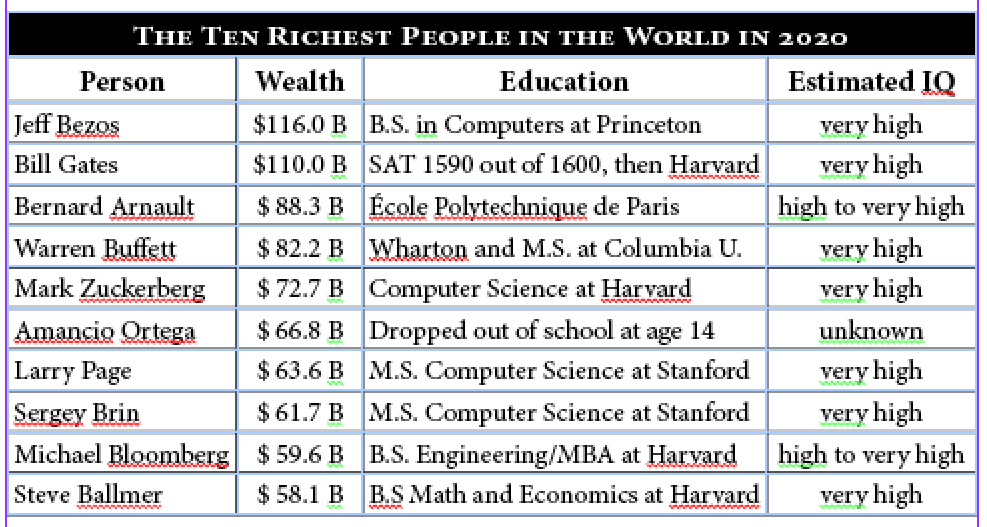In February 2020, CEOWORLD ranked the world’s 2153 billionaires from “richest to poorest”. As we might expect, these megawealthy individuals belong to the high-IQ group. However, the correlation between IQ and income is weak. Why?
The table below provides some insight into the net worth and the educational backgrounds of the top 10 in the Forbes list–all self-made billionaires, each having earned, rather than inherited, their wealth.

Almost all of the very richest people have very high IQ’s but this begins to drop off as we get further down in the ranks.
The IQs in the table are estimated from the scholastic records of the billionaires, including their SAT scores, the calibre of the universities at which they were accepted, and their academic standing on graduation. Since SAT scores are a significant determinant of acceptance at post secondary schools, the institution at which an applicant is accepted is a reasonably good estimator of his SAT score and, in turn, IQ. For example, Bill Gates had a near perfect score on his SATs (1590 out of 1600) and was accepted into Harvard where he studied law, mathematics, and computer science. Jeff Bezos, identified as “gifted” in elementary school, was accepted at Princeton and subsequently graduated summa cum laude in electrical engineering and computer science. Warren Buffet attended the Wharton School of Economics, where he studied for 2 years before transferring to the University of Nebraska from which he graduated at age 19. He subsequently earned a Master of Science degree in Economics at Columbia University. Bernard Arnault studied at the prestigious École Polytechnique de Paris where he received a BA in engineering. In 1985, he bought Christian Dior using $15 million from his father’s construction company and went on to build the luxury goods group LVMH that includes Louis Vuitton and Sephora. Carlos Slim Helú studied civil engineering at the National Autonomous University of Mexico where he simultaneously taught algebra and linear programming, en route to becoming the wealthiest person in Mexico.
While it may seem that most of those with very high income have high IQ’s, the converse is not necessarily true. That is, there are many people of very high IQ who do not have a high income. In fact, there is something strange in the relationship between IQ and income in the high-IQ group. During a dinner debate with Amy Chua (known as “Tiger Mom”) Larry Summers, President of Harvard from 2001–2006, quipped, “At Harvard, the A students tend to become professors and the C students become wealthy donors.”
Summers’ facetious comment actually carries more than a grain of truth, and it challenges the assumption that high intelligence necessarily results in high income. Among the crème de la crème in the intellectual arena are those gifted students who win medals in the mathematics olympiads and the collegiate Putnam Competition.
Many of these go on to win a Fields Medal or a Nobel Prize. But what are their career trajectories? A table in the recently published Intelligence: Where We Were, Where We Are, & Where We’re Going, provides a snapshot of the careers of 11 Mathematics Olympiad medal winners, between 10 and 20 years after their victories. Only one of the uniquely talented high-IQ people displayed in that table became an entrepreneur. Though they all have incomes that are significantly higher than average, they are not likely to become billionaires. The implicit assumption in the challenge, “If you’re so smart, why ain’t you rich?” is that everyone wants to be rich and those who aren’t have failed. On the contrary, those of high intelligence often have very different goals, aspiring to solve a famous unsolved mathematical problem, to construct a paradigm that changes how we understand our world, or to write an engaging novel. A tenured professorship at a prestigious university provides enough income for a very comfortable lifestyle, and more importantly, enables an individual to pursue an intellectual passion.
